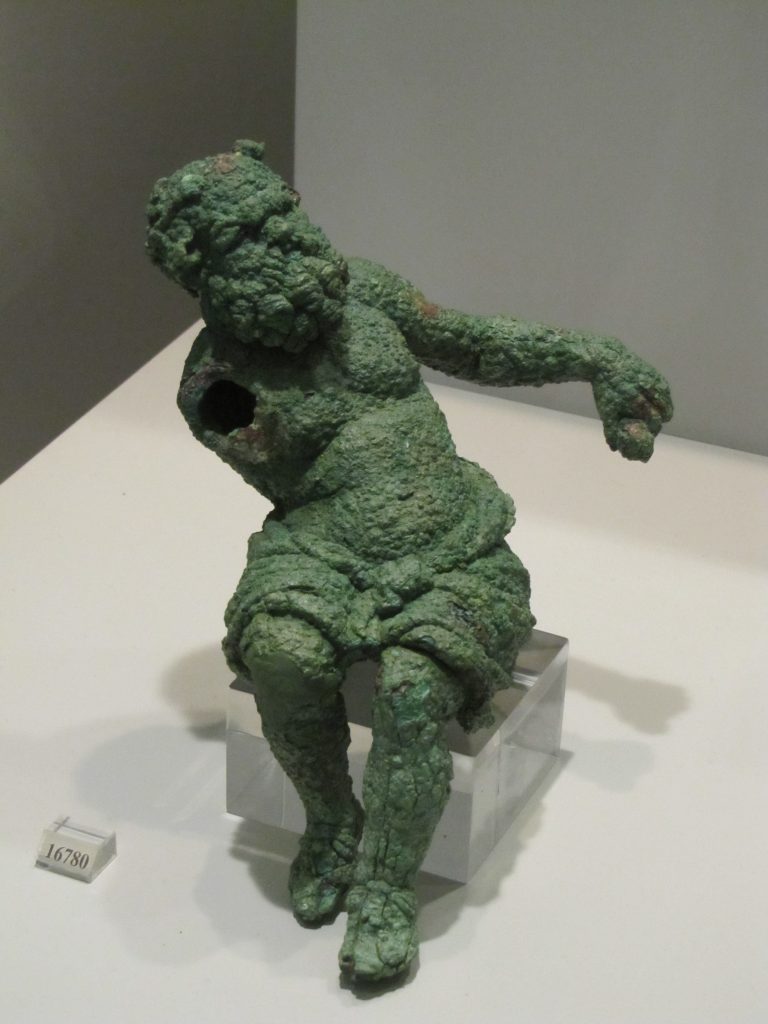Alcaeus of Lesbos
Listen to the poem in Ancient Greek

Translation by J. M. Edmonds
From a Second-Century Papyrus: – to say to him: ‘He who shared evil revels with an unseemly crew, as a mere stone of the base, now, by making merry with good-fellows of the idlest and vainest, has become the headstone over them all.’ And in the pride of his marriage with a daughter of Atreus let him do despite to his countrymen as he did with Myrsilus, till Ares choose to turn our luck and we forget this our anger and have rest from the heart-devouring pain and internecine battle which one of the Olympians hath roused in us to bring destruction on the people and to give delightful glory unto Pittacus.
Historical Information
Here Alcaeus makes scornful comment on the marriage of the tyrant Pittacus to a daughter from the Penthelid family. (Penthilus, the legendary family patriarch, was said to be a descendant of Atreus, father of Agamemnon and Menelaus, the commanders of the Greek forces in the Trojan War.) Alcaeus sees the problems besetting his fellow citizens of Mytilene as the result of the strife between various factions of Mytilene that have allowed Pittacus to seize power.
Biographical Information
Alcaeus of Lesbos (B. Ca. 630-620 BCE

All that remains of Alcaeus’ poetry are fragments, although it is known that at one point there were at least ten books of his verses in existence. Alcaeus (Greek spelling Alkaios) was an aristocrat from Mytilene on the island of Lesbos, living in a time of bitter civil strife: kingship on the island was overthrown, and an aristocratic family, the Penthelids, seized power. [The Penthelids claimed descent from Penthilus, a son of Orestes; this Penthilus was the legendary founder of Lesbos.] The Penthelids ruled so violently that two revolutions took place during their dominion; the second revolution ousted the family. During the seventh century BCE there was ongoing struggle among various aristocratic families.
Ancient evidence suggests that during Alcaeus’ childhood, his older brothers fought along with the aristocrat Pittacus to overthrow the then-current tyrant Melanchros. At some point Pittacus became the ruler of Mytilene, probably circa 600 BCE, and held power for ten years. We know that Alcaeus fought alongside Pittacus in battles between Mytilene and Athens over the town of Sigeum, located at the entrance to the Hellespont and hence a site of some strategic importance. Alcaeus relates in a poem that in one battle he had to make a quick retreat and leave his arms behind him – they ended up as spoils of war in the temple of Athena in Sigeum.
After peace was established over this conflict, the aristocratic factions on Mytilene renewed their internal strife. Alcaeus seems to have been involved in a conspiracy to overthrow the new ruler of Mytilene, Myrsilus. When a planned attack on Myrsilus failed, his conspirators fled to Pyrrha, another settlement on Lesbos. Pittacus had originally been part of the conspiracy, but had switched sides and allied himself with Myrsilus. Because of this, Alcaeus blamed Pittacus: they had sworn at a sacrifice to stick together, but the “fat-guts” Pittacus had forsworn his oath and had become the murder of his city.
Another of Alcaeus’ poems also contains complaints about the bitterness of exile. In the poem. In the poem blaming Pittacus, Alcaeus mentions the sworn purpose of the conspirators (hetairia) to liberate the people; in the complaints-from-exile poem, Alcaeus wants to be living among his fellow-citizens even though they do evil to one another. There are two surviving verses from a song celebrating the death of Myrsilus, but Alcaeus’ joy at this was premature: the Mytileneans chose Pittacus as regent (aesymnetes). We know little about Alcaeus’ life at this time, but it seems like that he spent at least parts of it in exile again. Fragments of poems include a warning against the man who will destroy the already crumbling city in his hunger for power, and a reproach to the citizens of Mytilene for lacking courage — presumably the courage to oust Pittacus. Some surviving lines of a poem depict Alcaeus greeting his brother Antimenidas, who has been serving with distinction in the Babylonian army: Alcaeus may have been welcoming his brother home to Mytilene.
Sources
Lesky, Albin. A History of Greek Literature. Translated by James Willis and Cornelis de Heer. 2nd Edition, Thomas Y. Crowell Company, 1966.
